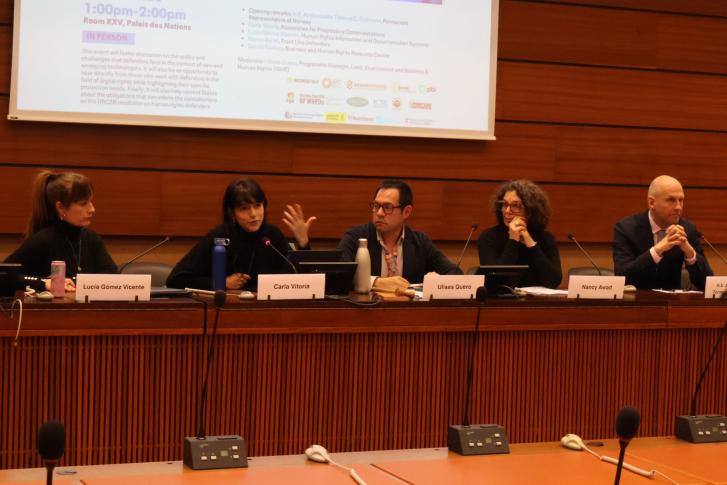
The Association for Progressive Communications (APC) welcomes the landmark resolution on human rights defenders and new and emerging technologies adopted by consensus at the 58th session of the UN Human Rights Council on 4 April 2025. This resolution addresses many of the concerns that APC and our partners have been advocating for in recent years and represents an important step forward for the protection of human rights defenders (HRDs), including women human right defenders (WHRDs), in the digital age.
Led by Norway and co-sponsored by over 50 countries, this resolution signals strong international commitment to ensure the protection of HRDs worldwide. APC was actively involved throughout the drafting process, providing written inputs and meeting with delegations. The final text incorporates recommendations from civil society, including points that had been raised by APC.
The path to consensus was not easy: the negotiation process required 12 informal sessions to agree on the text, with some actors attempting to weaken provisions through amendments. Despite these challenges, the resolution was ultimately adopted without a vote, representing a significant victory for the HRDs movement.
“Human Rights Defenders and Technology: A Blessing or a Curse?”
Prior to the adoption of this resolution, on 7 March 2025, on the sidelines of the 58th Human Rights Council session, APC co-sponsored a side event titled "Human Rights Defenders and New Emerging Forms of Technology: A Blessing or a Curse?". The event brought together defenders, state representatives and NGOs to discuss the protection of HRDs against technology-facilitated rights violations.
The panel, moderated by Ulises Quero from the International Service for Human Rights (ISHR), featured Carla Vitoria from APC, Lucía Gómez Vicente from the Human Rights Information and Documentation Systems, and Nancy Awad from Front Line Defenders, with opening remarks by H.E Ambassador Tormod C. Endresen, Norway's Permanent Representative.
This side event came at a crucial time, as 197 organisations, including APC, had published an open letter urging states to put forward a strong resolution regarding HRDs and digital tools. During the discussion, panellists highlighted the dual nature of technology for HRDs. While digital tools can amplify defenders' voices and improve documentation capabilities, they also expose defenders to new forms of threats, from surveillance and spyware to online harassment and gender-based violence. As Carla Vitoria from APC noted during the event, "Tech-facilitated violence is not confined to the digital realm: there is a continuum from online to offline violence."
The points raised at this side event are duly recovered and addressed in the resolution recently adopted by the Human Rights Council.
Key achievements in the resolution
The resolution introduces commitments for both governments and private companies on a range of digital issues, including the following:
1. Biometric mass surveillance
For the first time in a UN resolution, governments are called upon to ensure that biometric identification and recognition technologies, including facial recognition, are not used for mass surveillance by public or private actors. This is a significant advancement in protecting HRDs from emerging surveillance threats.
2. Internet shutdowns and connectivity
The resolution explicitly addresses not only internet shutdowns but also other practices that impede connectivity, including filtering and throttling measures. It encourages diverse technological solutions to advance connectivity, including creating an enabling environment for small, non-profit and community-centred internet operators.
3. Spyware and surveillance
The resolution calls on states to "refrain from or cease the use or transfer of new and emerging technologies, including artificial intelligence applications and spyware" that cannot be operated in compliance with international human rights law. It also calls for mechanisms to provide appropriate remedies for victims of surveillance-related violations.
4. Business responsibility
The text underscores the responsibility of business enterprises, particularly those in the tech industry, to respect human rights, including the rights of HRDs. It encourages companies to implement human rights due diligence throughout the life cycle of their products and services.
5. Strategic lawsuits against public participation (SLAPPs)
The resolution calls on governments to adopt and implement laws and policies that discourage strategic lawsuits against public participation targeting journalists, media outlets and HRDs.
6. Online attacks against women
The resolution condemns online attacks against women and girls, including gender-based violence and abuse facilitated by technology, such as doxxing, deepfakes and online harassment. It calls for gender-responsive approaches to address these particular forms of online discrimination.
Looking forward
UN resolutions are not binding documents; however, they represent a strong political commitment by states to act in line with their international human rights obligations and carry significant normative weight. APC will continue to work with partners to ensure that these commitments translate into concrete action at the national level to protect human rights defenders in the digital age.
While this resolution represents significant progress, some important issues remain unaddressed. Initially, the resolution included a reference to transnational repression, but this was removed in the final version, though indirect references remain. The resolution also lacks explicit recognition of the positive role of child HRDs in the digital space and their specific protection needs.
As part of the resolution's implementation, the Office of the UN High Commissioner for Human Rights (OHCHR) is mandated to convene three regional workshops to assess risks created by digital technologies for HRDs and identify best practices to address these concerns. The OHCHR will also prepare a report with recommendations for improved responses to these risks, to be presented at the 63rd session of the Human Rights Council.
The adoption of this resolution is a testament to the power of collective civil society advocacy. It provides a framework for holding states and companies accountable for protecting those who defend human rights in an increasingly digital world. Now, implementation will pose us with the challenge of transforming these commitments into meaningful protections for HRDs around the world and across regional and local contexts.